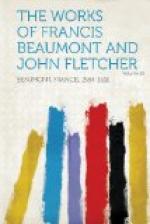George Buck.
On Mr BEAUMONT.
(Written thirty years since, presently after his death.)
Beaumont lyes here; and where now shall
we have
A Muse like his to sigh upon his grave?
Ah! none to weepe this with a worthy teare,
But he that cannot, Beaumont, that
lies here.
Who now shall pay thy Tombe with such
a Verse
As thou that Ladies didst, faire Rutlands
Herse?
A Monument that will then lasting be,
When all her Marble is more dust than
she.
In thee all’s lost: a sudden
dearth and want
Hath seiz’d on Wit, good Epitaphs
are scant;
We dare not write thy Elegie, whilst each
feares
He nere shall match that coppy of thy
teares.
Scarce in an Age a Poet, and yet he
Scarce lives the third part of his age
to see,
But quickly taken off and only known,
Is in a minute shut as soone as showne.
Why should weake Nature tire her selfe
in vaine
In such a peice, to dash it straight againe?
Why should she take such worke beyond
her skill,
Which when she cannot perfect, she must
kill?
Alas, what is’t to temper slime
or mire?
But Nature’s puzled when she workes
in fire:
Great Braines (like brightest glasse)
crack straight, while those
Of Stone or Wood hold out, and feare not
blowes.
And wee their Ancient hoary heads can
see
Whose Wit was never their mortality:
Beaumont dies young, so Sidney
did before,
There was not Poetry he could live to
more,
He could not grow up higher, I scarce
know
If th’ art it selfe unto that pitch
could grow,
Were’t not in thee that hadst arriv’d
the hight
Of all that wit could reach, or Nature
might.
O when I read those excellent things of
thine,
Such Strength, such sweetnesse coucht
in every line,
Such life of Fancy, such high choise of
braine,
Nought of the Vulgar wit or borrowed straine,
Such Passion, such expressions meet my
eye,
Such Wit untainted with obscenity,
And these so unaffectedly exprest,
All in a language purely flowing drest,
And all so borne within thy selfe, thine
owne,
So new, so fresh, so nothing trod upon.
I grieve not now that old Menanders




